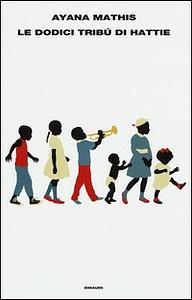Take a photo of a barcode or cover
Listened. In 1923, at 15, Hattie moves from Georgia to Philadelphia. She marries very young and has twins at 16, losing them to pneumonia. She has 9 more children, and there is a chapter for each of them. We see Hattie's life mostly through her children. Not an easy life, not ever. Excellent book, a first novel.
reflective
medium-paced
Plot or Character Driven:
Character
Strong character development:
Yes
Loveable characters:
Complicated
Diverse cast of characters:
Yes
Flaws of characters a main focus:
Yes
I liked the stories within this book, but they felt disjointed and at the end I wanted to know the "endings" to many of them. I felt like many of the stories had no closure since the characters were not brought up during later stories.
Beautify written heartbreaking set of short stories about Hattie and her children.
Left me wanting more, but a lovely way to tell a story about a family.
Left me wanting more, but a lovely way to tell a story about a family.
slow-paced
This isn't the happiest of books. There wasn't much to like in the characters, and although I could see their pain, I didn't want to get too close to it. Maybe it's because the characters struck a little close to home. It's easy to see how people push others away to stop them, or themselves from being hurt, only to hurt alone, or hurt them even more. Mathis caught some of the cadences of family, but I might have liked the story more with a little leavening. And the leavening wouldn't have been unrealistic, both my parents came from large families where love would have been spread out. The story of my father's family is not unlike this one, they were part of the great migration. Some of the kids' lives turned out better than others, but there was good and bad, happiness and sadness, it wasn't all blight, and at times it felt like this was. Also, I didn't understand why it's the twelve tribes, when there are only eleven children. Or is Hattie one of the tribes? I'd have liked to have heard more of the stories in her words perhaps - in the chapters where we see her with her babies, she's tender and loving, but that isn't the experience most of her children have, and I'm left wondering why.
I don't easily award 5 stars, but Hattie earned them from me for its exceptional writing. This is the first book I have encountered that tells the story of a mother and a father through the eyes of their grown children. The dual unique perspective of a story of a family from multiple adult siblings and an elderly grandmother was intriguing. I am looking forward to hearing Ayana Mathis lecture in Delaware this month and hearing what my fellow book club members thought. The Iowa Writers Workshop proves itself once again, with Ayana sharing the stage with authors like Ann Patchett and Abraham Verghese.
A complex and intricate piece of story telling that weaves backwards and forwards in time telling us about Hattie and her life and the lives of her children. Fabulous.
I'm always amazed that author's can write so convincingly about eras from long ago, and this book is a superb example of that.



